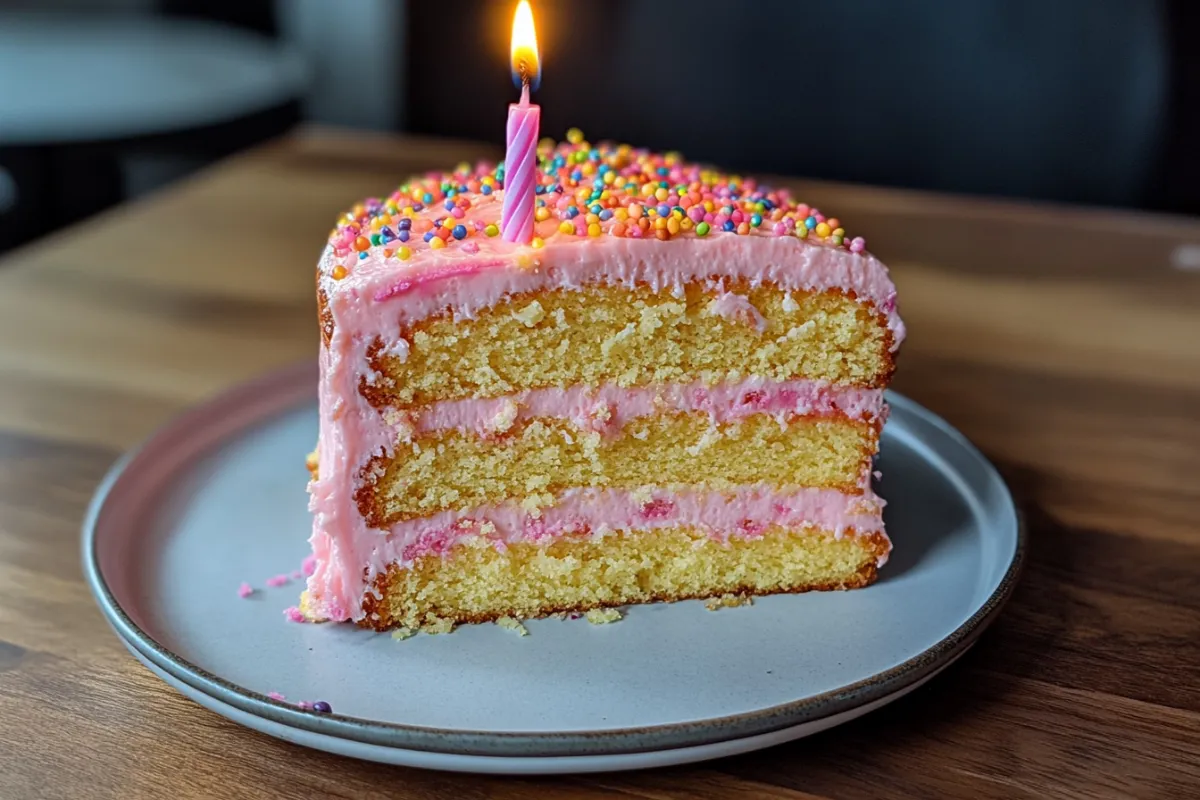Why Cake is So Special on a Birthday
A birthday cake is more than just a dessert; it represents celebration, love, and joy. The tradition of blowing out candles on a cake, making a wish, and sharing it with loved ones has become an integral part of birthday celebrations around the world. But why is cake considered so special for birthdays? What makes it the quintessential birthday treat? In this article, we will explore the historical, emotional, and cultural significance of birthday cakes, why they continue to be central to celebrations, and the various ways cakes have evolved to reflect personal preferences.
By the end of this comprehensive guide, you’ll understand why a birthday cake is the ultimate symbol of celebration and how it continues to evolve with modern trends.
The Origins of Birthday Cakes
The tradition of celebrating with cake dates back centuries. Ancient cultures like the Egyptians, Greeks, and Romans used cakes during religious ceremonies, particularly in celebrating gods. Cakes were considered offerings to the gods, marking milestones and important events. This laid the groundwork for the modern concept of a birthday cake. According to Patisserie Valerie, the Greeks added candles to cakes, symbolizing the glow of the moon and presenting it to the goddess Artemis.
By the Middle Ages, the practice of using cakes to celebrate special occasions spread throughout Europe, and the Industrial Revolution made cakes more accessible to the masses. Sugar, which was once a luxury, became more affordable, allowing people of all social classes to enjoy birthday cakes. This shift made cakes not just a status symbol, but an integral part of birthday celebrations, symbolizing joy and shared happiness.
Why Cake is the Ultimate Symbol of Celebration
Cakes symbolize happiness, abundance, and indulgence. When someone presents a birthday cake, they offer more than just food—they offer a shared moment of celebration. The act of gathering around a cake, singing “Happy Birthday,” and cutting slices for everyone creates a sense of unity. The cake becomes a tangible representation of love and well-wishes from friends and family. This guide offers insights on how birthday cakes have been personalized over time, further adding to their emotional significance.
Emotional Impact of Cakes
The emotional connection to birthday cakes goes beyond tradition. For many, the sight of a cake brings back childhood memories of family gatherings, friends, and fun. The flavor of a cake, whether it’s rich chocolate or a simple vanilla sponge, is often tied to personal memories. In this way, birthday cakes evoke feelings of nostalgia and happiness.
Moreover, cakes play a vital role in marking milestones—whether it’s a first birthday, a sweet 16, or a 50th celebration. A cake is the centerpiece of the party and can be customized to suit the individual’s personality, making the celebration even more personal.
Modern Birthday Cake Trends
As times change, so do birthday cakes. Modern trends in birthday cakes reflect not only aesthetic choices but also personal preferences. Here are some popular birthday cake trends that have become widely loved:
- Drip Cakes: These cakes are covered in ganache or icing that drips down the sides, offering a visually appealing, luxurious look.
- Naked Cakes: These minimalist cakes have minimal frosting, letting the layers show through. They are often adorned with fresh fruit or flowers, making them a hit at rustic or elegant events.
- Rainbow Cakes: With layers of brightly colored cake inside, these cakes add fun and surprise to any birthday party.
To explore more on the latest cake decorating trends, check out the modern cake trends guide.
Personalizing a Birthday Cake
One of the main reasons birthday cakes are so special is that they can be completely personalized. From choosing the flavor to customizing the decoration, a birthday cake can reflect the unique tastes and preferences of the birthday person. Popular options for personalizing a cake include:
- Adding the birthday person’s favorite colors or hobbies (sports themes, favorite characters, etc.).
- Including custom messages, names, or even edible photos.
- Incorporating dietary needs such as gluten-free, vegan, or keto options.
Personalized cakes show that thought and effort have been put into the celebration, making the person feel valued and special on their big day.
The Tradition of Birthday Candles
Birthday cakes are often accompanied by the tradition of lighting candles. This practice, dating back to the ancient Greeks, involves placing candles on the cake—one for each year of the person’s life. The idea behind blowing out the candles and making a wish is steeped in superstition. According to ancient beliefs, the smoke from the extinguished candles carries the birthday wish to the gods.
While we may not believe in the ancient myths anymore, the tradition of blowing out candles has persisted as a fun and magical part of any birthday celebration. It adds an element of ritual to the event, making the cake-cutting moment even more special. Learn more about the history of this tradition in the history of birthday cakes article.
The Role of Cake in Different Cultures
Birthday cakes vary widely across cultures, but the core idea remains the same—a cake is the highlight of the celebration. Here are some cultural variations in birthday cakes:
- Tres Leches Cake in Latin America: A sponge cake soaked in three kinds of milk, making it rich and moist.
- Black Forest Cake in Germany: A layered cake with chocolate, cherries, and whipped cream.
- Chiffon Cake in Japan: Known for its light, airy texture and often served with fresh fruit.
Despite the differences, the common thread across cultures is that cakes are a sign of celebration and good fortune. Each culture adds its own twist, making birthday cakes a global tradition.
Dietary Considerations for Birthday Cakes
As more people adopt dietary preferences or restrictions, the options for birthday cakes have expanded significantly. Modern bakeries and home bakers offer a wide range of cakes that cater to these needs without sacrificing flavor or quality.
Gluten-Free Cakes
Many people now seek gluten-free cakes, made from alternative flours like almond, rice, or coconut. These cakes are often just as moist and flavorful as traditional cakes, ensuring that everyone at the party can enjoy a slice.
Vegan Cakes
Vegan cakes have grown in popularity as more people move toward plant-based diets. Replacing traditional ingredients like eggs and butter with applesauce, flaxseeds, or coconut oil allows bakers to create rich, decadent cakes that cater to vegans and those with dairy allergies.
Low-Sugar or Keto Cakes
For those looking to reduce sugar intake, keto birthday cakes use alternative sweeteners like stevia or monk fruit. These cakes often use almond or coconut flour to replace regular flour, resulting in a dense but satisfying dessert that fits within a low-carb diet.
For more insight into dietary considerations, check out the ultimate guide to chocolate cakes.
Why Cake is a Must-Have for Birthdays
The essence of a birthday cake is that it marks a special moment in a person’s life. It’s a way of celebrating their existence, achievements, and growth. Sharing cake with loved ones is a joyful act, and no birthday party feels complete without the ritual of cake cutting and sharing.
Moreover, birthday cakes have become deeply ingrained in the cultural fabric, making them an essential part of any celebration. Whether it’s a simple homemade cake or a grand multi-tiered creation, the presence of cake symbolizes festivity, unity, and well-wishes.
FAQs About Birthday Cakes
- Why do we celebrate birthdays with cake?
Cake symbolizes joy, indulgence, and celebration. Its history is tied to ancient traditions, and it has evolved into the centerpiece of modern birthday celebrations. - How did the tradition of blowing out candles start?
The tradition dates back to the Greeks, who lit candles on cakes as an offering to Artemis, the goddess of the moon. The smoke was believed to carry wishes to the gods. - Can birthday cakes be personalized?
Yes, birthday cakes can be personalized with names, decorations, themes, and dietary considerations to make them special for the individual. - What are the most popular flavors for birthday cakes?
Popular flavors include chocolate, vanilla, red velvet, and funfetti, but modern cakes also incorporate unique options like lemon, salted caramel, and mocha. - What are the best birthday cake trends in 2024?
Popular trends include drip cakes, naked cakes, and dietary-friendly cakes like gluten-free and vegan options.
Conclusion
A birthday cake is more than just a dessert; it’s a tradition that has stood the test of time. It holds emotional significance, representing the love and joy shared by family and friends. From ancient celebrations to modern personalized designs, birthday cakes continue to be a cherished part of birthday celebrations worldwide.
To learn more about birthday cake trends, check out our guide on the best birthday cake options and other insights from our ultimate birthday cake guide.

